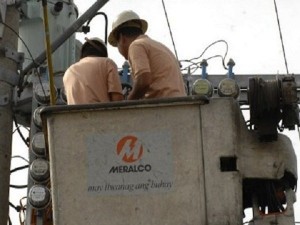60-day extension of TRO on power rate
MANILA, Philippines—The temporary restraining order (TRO) on the P4.15 per kilowatt hour increase in the generation charge that Manila Electric Co. (Meralco) wants to collect from its customers has been extended.
Four days before the TRO was set to lapse, the Supreme Court yesterday extended it for 60 days or until April 22, tribunal spokesperson Theodore Te said.
The high court granted the urgent motion for extension of the TRO and/or preliminary injunction that the Makabayan bloc filed on Feb. 12.
The Supreme Court directed generating companies (gencos) not to demand and collect “the deferred amounts representing the affected costs based on the matters raised in Meralco’s Dec. 5, 2013, letter.”
The gencos include Masinloc Power Partners Co. Ltd., c/o AES Philippines, San Miguel Energy Corp., South Premiere Power Corp., First Gas Power Corp. and the National Grid Corp. of the Philippines.
Article continues after this advertisementThe TRO also stopped Philippine Electricity Market Corp. (PEMC), operator of the energy spot market, from demanding and collecting the generating charges.
Article continues after this advertisementThe extension came after the Supreme Court wrapped up last week oral arguments on the petitions against the Meralco power rate increase.
Still hopeful
Following the TRO extension, Meralco head of legal affairs William Pamintuan said the distribution utility, the biggest in the country, would abide by the Supreme Court decision.
In a statement, Pamintuan said Meralco “will continue to discuss with the generation companies, PEMC, DOE (Department of Energy), ERC (Energy Regulatory Commission), consumer groups and other stakeholders regarding this issue.
“Meralco is still hopeful that this case before the SC will be resolved at the soonest possible time to the satisfaction of all stakeholders.”
Decision welcomed
Bayan Muna Rep. Neri Colmenares, one of the two petitioners against the Meralco rate increase, welcomed the decision of the high court to extend the TRO.
“We just hope that the Supreme Court will also declare unconstitutional [the Electric Power Industry Act of 2001] so that such predatory pricing preying on electricity consumers would not happen again,” Colmenares said in a text message.
The Makabayan bloc and the National Association of Electricity Consumers for Reform (Nasecore) went to the high court to question the increases.
They accused the ERC of grave abuse of discretion for hastily approving the increases last December despite “three highly irregular or unprecedented events, which should have stayed its approval as market-abuse regulator.”
The increase, when added to the generation charge of P5.6673 per kWh, would have resulted in a power-generation charge of P9.1070 per kWh without the staggered implementation.
For a typical household using 200 kWh a month, a one-time increase of P830 would have pushed its monthly bill from P2,212 to P3,041.48.
Meralco wanted to collect a P4.15 per kWh rate adjustment from its 5.3 million customers to recover some P9.6 billion in power generation costs last November.
Simultaneous shutdown
The rate increase stemmed from the shutdown of the Malampaya gas pipeline for maintenance from Nov. 11 to Dec. 10.
A number of power generation plants also shut down during this time, creating a 45-percent shortfall in the average 6,000 megawatts that Meralco supplies to customers.
The shortfall prompted Meralco to buy a more expensive supply from the Wholesale Electricity Spot Market (WESM) and to pass on the cost to its customers.
The shutdown of the pipeline also forced plants that use the cheaper natural gas from Malampaya and supply power to Meralco to use more expensive fuel.
The ERC approved a staggered rate increase to be collected in December, February and March.
But last Dec. 23, the high tribunal issued a temporary restraining order, stopping Meralco from collecting the increase for 60 days or until Feb. 21.
In the wake of the TRO extension, Meralco’s participation in the electricity spot market may be reviewed.
Payables, bond
Meralco still has some P13.5 billion in payables for December and January to PEMC, the WESM operator, but it is constrained from passing on such costs to consumers because of the TRO.
Of the total, some P6 billion in deferred payment was for last December and P7.5 billion for January this year.
Energy Secretary Carlos Jericho Petilla told reporters that he had authorized PEMC to draw down Meralco’s security deposit or bond of P2 billion, which enables it to participate on the spot market as a buyer of electricity whenever its requirements exceeded its contracted electricity.
Petilla said Meralco would be given the chance to ask PEMC to retain its membership on the WESM despite the draw-down to prevent potential service disruptions.
He said the quick resolution of the power rate hike issue, whether via the Supreme Court or ERC, would be beneficial to all power stakeholders and prevent market disruptions.
PEMC president Melinda Ocampo said the spot market operator had yet to withdraw Meralco’s bond. “We have yet to receive the TRO so we will consider its content on whether we can in fact withdraw the bond,” she said.
Originally posted: 9:17 pm | Tuesday, February 18th, 2014
RELATED STORIES
SC extends TRO on Meralco rate hike
Lawmaker wants Meralco franchise reviewed amid power rate hike bid
Meralco, other power firms face SC to defend rate hike
